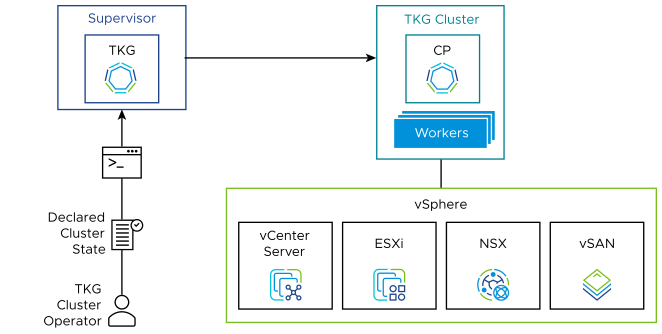TKG Service provides two APIs and supporting clients for provisioning TKG clusters and managing their lifecycle.
TKG Cluster Provisioning

TKG Cluster Types
- TanzuKubernetesCluster with CAPI Cluster referring to default ClusterClass named tanzukubernetescluster
-
Cluster signature:
apiVersion: run.tanzu.vmware.com/v1alpha3 kind: TanzuKubernetesCluster
This type of workload cluster is a TKG Cluster built using the Cluster API (CAPI) that refers to a default ClusterClass named
tanzukubernetescluster. The cluster type is TanzuKubernetesCluster and the provisioning API isv1alpha3. Because this is an abstraction on top of a CAPI cluster, the reference to the backend cluster class is not specified in the cluster manifest. The reference is handled by the system.With this type of workload cluster, the TanzuKubernetesCluster object is front line and serves as an abstraction layer. There is no change in workflow for provisioning this type of cluster from provisioning a TKGS cluster on vSphere IaaS control plane version 7.
- CAPI Cluster referring to default ClusterClass named tanzukubernetescluster
-
Cluster signature:
apiVersion: cluster.x-k8s.io/v1beta1 kind: Cluster
TKG Cluster Provisioning APIs
TKG on vSphere 8 Supervisor provides two APIs for managing the lifecycle of TKG clusters: v1alpha3 and v1beta1. Both APIs are declarative in nature, similar to the Kubernetes API. With declarative cluster provisioning, you specify the desired state of the TKG cluster: number of nodes, available storage, VM sizes, Kubernetes software version. TKG does the work to provision and maintain a cluster that matches the declared state.
v1alpha2 API before you begin the upgrade process. Refer to the upgrade documentation for complete details:
Updating TKG Service Clusters.
| API | Kind | vCenter version | Description |
|---|---|---|---|
| v1beta1 | Cluster | vCenter 8+ | New API for managing the lifecycle of a Cluster based on a Cluster Class. |
| v1alpha3 | TanzuKubernetesCluster | vCenter 8+ | Continuation of the v1alpha2 API. All features supported by the API v1alpha2 are supported by the v1alpha3 API. New features added. |
| v1alpha2 | TanzuKubernetesCluster | vCenter 7 U3 | Legacy API for provisioning Tanzu Kubernetes clusters on vCenter 7 U3 Supervisor, and for upgrading clusters to vCenter 8 Supervisor. On upgrade to, or provisioning on, vSphere 8, the v1alpha2 API is auto-converted to the v1alpha3 API. |
| v1alpha1 | TanzuKubernetesCluster | vCenter 7 U1, U2 | Deprecated API for provisioning Tanzu Kubernetes clusters on the first generation of vCenter 7 Supervisor. |
TKG Cluster Provisioning Clients
- Kubectl + YAML for Kubernetes-style declarative cluster provisioning. See Workflow for Provisioning TKG Clusters Using Kubectl.
- Tanzu CLI for interactive command-line cluster provisioning. See Workflow for Provisioning TKG Clusters Using the Tanzu CLI.
- Tanzu Mission Control for web-based cluster provisioning. See Registering Tanzu Mission Control Hosted with Supervisor.